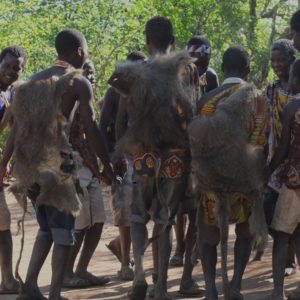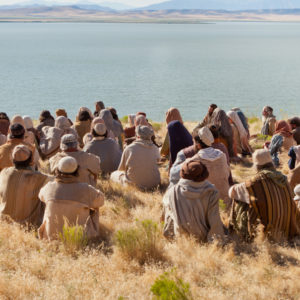The following is a chapter from the book ‘Oralities and Literacies: Implications for Communication and Education‘. A chapter will be posted here each week.
Chapter 8 – From Kushe to Jos
by Emmanuel Jatau
A Road for Ministry with Oral Tradition Cultures and Oral Learners
Orality is not just about the ways and means that some people communicate or learn. It is about people. Real people in their context. It affects every pastor, every missionary and every Christian leader as they try to connect those people with the Living Word. As we begin this discussion, it is important to begin with a description of the names of places mentioned in the topic above for a better understanding of the context. Kushe is a district in Kagarko Local Government of Kaduna State Nigeria, with a population of about 30,000 people. This is where I was born and learned my mother tongue the Koro language. It was here that I first began the journey towards literacy by learning to read in Hausa, which is my second language, and then in English. I consider myself an oral learner because of the influence this village life had on my early development.
Jos is the capital city of Plateau State Nigeria. This city has a population of about one million people, and a geographic distance of about 60 miles from Kushe. I went to Jos in 1995 as a seminary student, and then continued with ministry after graduating with a Bachelor of Arts in Theology. For 17 years I worked as everything from children’s pastor, youth pastor, assistant chaplain, associate pastor, a lecturer and to senior pastor of ECWA Seminary Church (a local congregation within the Jos ECWA Theological Seminary Compound). Telling the stories here in this presentation helped open my eyes to how my identity has been shaped by my interaction with the world outside of Kushe. There is much we can learn from narratives (Goffman, 2006. P. 12-13) and for me, I have seen how I have been shaped as I narrate my experience in this paper.
The Road to Jos
I invite you to take a walk with me down my road from Kushe to Jos, Nigeria. It is a road that includes many kinds of people and different levels of orality. Every step closer to Jos finds people learning the orientation of textuality and skilled further in literacy. The story begins with fond memories of my sweet mother and who is now resting in glory. The women in the local church were encouraged to learn how to read and write, and my mother picked up the challenge and requested that I teach her how to read. The manual we used began with Hausa alphabets, then a combination of vowels and consonants to build vocabularies. The entire period of this project ended with my Mum only able to pronounce the name “Dauda,” which she discovered in the manual, which happens to be the name of my elder brother. The excitement of seeing the name of her son in the manual overtook the desire to learn how to read. The project ended with my mum only able to pronounce the word Dauda irrespective of whatever consonant and vowel that is combined. She couldn’t even write her own name Gimbiya.
Then in 2001, she visited me in Jos and challenged me and another pastor from my village Kushe, who lives in Jos. This pastor came to greet my mother, as our custom requires, and my mum asked us about the pastoral ministry in the city of Jos. She asked us if we ever really cared to find out the spiritual condition of our brothers in the village. She said, “you pastors told us the story of Nehemiah who was in another land but kept asking about the condition of his people in Jerusalem and as a result he came back and rebuilt the city.” Then she said to us “darkness is overtaking our village; your brothers are drifting away from the faith.” We picked up the challenge that year and returned home starting a prayer ministry that has continued till now. It came as a result of this precious non-literate woman recalling a biblical story and its application.
I have no idea of how many sermons my Mum heard from the story of Nehemiah, but one thing I am sure of is that she did not read it. Yet she could use the story to challenge two literate city pastors who began a prayer ministry with the hope of seeing a revival one day. My Mum was an oral learner and demonstrated that oral learners most easily hear to process and retain stories from the Bible.
Worship in the Village
I remember how difficult and boring worship was in the church, as we sang hymns from the hymnals. These are Hymns handed to us by the missionaries as Chuck Madinger rightly observed (Madinger, 2010, p. 202). Apart from the fact that the majority in the congregation couldn’t read, there was disconnect with the message of the songs because the theology of some of the songs did not reflect the context of the worshippers. The story was however different when the women started composing and singing songs in the local dialect. From that time on, worship became dynamic and vibrant. In the late 1980s local musicians started to record songs in the local dialects and that really transformed worship. Today that same road led to a big industry, as many young people now express creativity in music and dance to communicate the gospel message.
Drama
On the road to Jos in 1988 I enrolled as a student of Kaduna State College of Education Kafanchan, and began to develop my skills in reading, writing and learning by means of print rather than simply hearing messages as my mother did. In one of my electives (Drama Minor), I participated in a project known as “Open Theatre.” We were assigned to two different communities, one was Takau and the other Madakiya. We interviewed the villagers randomly to discover their immediate needs. What stood out as major need in both communities, was lack of access to government subsidized fertilizer. This was intended for the poor rural farmers, but the business men would intercept the fertilizer and sell it to the farmers at an exorbitant price.
We came back to school and composed a play on fertilizer distribution. The aim was to educate the farmers on how to hold their leaders accountable. It was also meant to expose the government officials and how the business men and women gain access to the fertilizer that was meant for them. We then took this drama back to the two communities and had an open presentation in the village square. We were learning the art of taking what we learned in the classroom and our readings back to the people of our villages who would never otherwise learn those ways.
We could have printed the research findings for the people of Takau and Madakiya, but that would mean nothing to them. The drama however helped in exposing those involved in corruption and empowering the poor farmers in holding their leaders accountable. This was a way of reaching out to an oral community that I was being exposed to then without knowing.
Ministry in Jos
The road eventually leads to Jos where, as a seminary student, I was involved in gospel outreaches and the film ministry, particularly showing The Jesus Film in Hausa. I was also involved in drama ministry. All the effort was to reach the rural people who are oral learners with the Gospel of our Lord Jesus Christ. Theses outreaches witnessed many who prayed to receive Christ and some rededicating their lives to Christ, because they watched The Jesus Film and heard the message of salvation and understood its implications. The same thing with drama presentations depending on the context we were ministering and the challenge of the community. For example, it could be drunkenness; prostitution, child trafficking or a drama that demonstrates peaceful coexistence between two communities.
I always used my experience as an actor during my sermon presentations to make my sermons lively and clear. I tell stories or proverbs that are very familiar to help clarify concepts. As a lecturer who teaches homiletics and expository preaching, I require students to come up with stories, proverbs or short plays in their sermon presentation. Only by the deployment of methodologies that help the oral learner, that the message will make meaning, hence my insistence for the use of proverbs, songs, dance drama and stories in sermon presentation and demanding same from my students.
Those of us entering the seminary were far more skilled in reading, writing and functioning in the world of text and print. Yet, at our basic learning levels we still preferred oral methods! One of my elders was a professor, but each time he communicates, whether in the board meeting or in his sermon delivery, he tells stories to make his point clear and succinct. People love his sermons not because he is a professor, but because he connects with the people. One time the senior pastor presented an agenda and was dragged into a long discussion that seemed to have no end and these were highly educated set of elders. It was this professor who brought the long discussion to and end with just a simple proverb in Hausa which says, “in kifi ya ruba, a duba kai” which means, “for a fish to get rotten it begins from the head.” The implication is that when the leadership is sick, the body will be affected. And all the elders immediately understood the implication and ended the discussion by voting to support the senior pastor’s proposal.
Ministry
One sure need of ministry now in Nigeria is how to effectively reach out to the oral-illiterate, the oral-literate and the highly oral-literate literate populace with more meaningful and effective discipleship strategies. We must seek better oral methods of communicating the gospel; telling the grand story of the Bible in such a way that the learners will see that this grand story is their story too as Sean Gladding titles his book: “The Story of God the Story of Us.” Our mandate as Christ’s disciples is clear, Jesus commissioned us to go and make disciples of all nations, baptizing and teaching them to obey all that he has commanded (Mat. 28:19-20).
We celebrate the growth of the church in Africa but the questions that should be asking are: “What kind of Christianity? Is it able to deal or withstand the threat of Islamic fundamentalism? Is it able to deal with the menace of tribalism, ethnicity and sectionalism? Is it able to deal with endemic corruption? Is it able to deal with nominalism, syncretism and witchcraft? Is it able to raise politicians who will represent Christ in the legislative chambers in African nascent democracy?”
The Road Less Traveled
My road from Kushe to Jos was not just the 60 miles of distance. It was a road that led me to new ways of doing things – like learning. It wasn’t a better place. It was just different from the ways of Kushe and my family in that small village. And, it is the thousands of villages like Kushe that truly make up my country of Nigeria. And even when we travel to larger cities, learn new ways, and become more “sophisticated,” we can still connect with those at home. We might improve on the larger languages (Hausa and English), but our hearts quickly warm to the sound of our local dialects as well as the sounds and sites of the village. To reach them we must never leave them “behind.” We cannot force them to the place where we now live – in print and text, yet preferring the oral. We must meet them on the road where they live with the good news packaged in stories, songs, dance drama, and proverbs.
The renowned and prolific African literary icon Chinua Achebe in his classic novel “Things Fall Apart,” said “among the Ibo (of South-eastern Nigeria) the art of conversation is regarded very highly, and proverbs are the palm-oil with which words are eaten” (Achebe 1959 6-7). Similarly Mokitimi in his article “A Critique of Western Definitions of Literature: Proverbs as Literature of the Illiterate says, the dictionary’s definition of literature as “as everything in print is limited because it leaves out oral literature or verbal art (Mokitimi 2010 49). An abstract subject suddenly comes alive when the speaker tell stories or proverbs that the people are familiar with.
Conclusions
Discipling to oral learners is a noble task, especially now that the Church is experiencing a phenomenal growth in the global South. It is important to note here that all of members of the human race begin life first as oral learners. The story of creation points to the fact that our God is a God of orality. We encounter Him in Genesis calling out creation into existence. It is later in the Pentateuch that we will encounter him telling Moses to write down the Law. The Bible also recognizes the fact that in this life there will be those who will be able read the Bible, and there will be those who will only hear what is read (like my mother). Oral learners will always be with us (Revelation 1:3).








